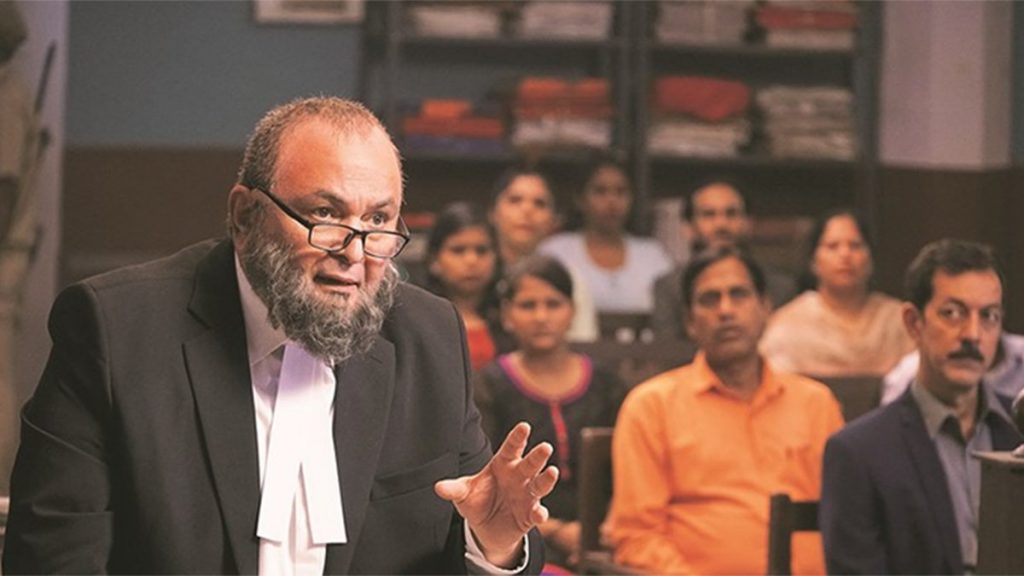Aarti Mohammed (Taapsee Pannu) has adopted her husband’s last name but not his faith. She loves her husband’s family but is steadfast about giving her child the freedom to choose his/her religion or probably none if the child so chooses. Murad Ali (Rishi Kapoor), an otherwise devout Muslim, is irritated with blocking streets for prayer but in the same vein points out how so much of all religion plays out on the streets. The wonderful thing about Mulk is it doesn’t justify either behaviour. Unlike most films with lopsided jingoism, Mulk begins on multiple contradictory notes and sticks to its guns throughout, mostly without prejudice and with some amazing rope walk balance skills.
The plot details the story of a happy Muslim family caught in the whirlwind of Islamic terror when their young boy bombs a bus full of innocents and is killed in a subsequent encounter with the cops. The family denounces the boy and his act, refuses to accept the body of a terrorist and yet comes under the radar of the investigative agencies. The father and the uncle are arrested for aiding and abetting the heinous crime. The rest of the film is largely a courtroom drama aiming to answer the difficult question … how does one prove love for one’s country?
So how does one really prove patriotism? For the vast majority in this country, that question just doesn’t arise. Thanks to a partition in 1947 based on religious lines and unless explicitly proved otherwise, one is patriotic simply by virtue of being born non-Muslim. An average Muslim clearly does not enjoy that same luxury and the ‘Us versus Them’ argument has only gained more traction in recent years. A broad brush is used to paint an entire community and made to answer for the acts of a few. Is that a fair ask of citizens who chose country over faith more than 70 years ago? Mulk delves into all these questions with the zeal of a true patriot and does not shy away from the seemingly simple questions and the complicated nuanced answers that follow.
Mulk does not absolve a certain section of burning firecrackers in a Pakistan win. Neither does it absolve Muslims of not keeping a close watch on how their young are getting influenced by the ‘Jihadi’ ideology nor of using loudspeakers for religious ends. Mulk does not absolve the Hindus of building up paranoia and a fake narrative against an entire community for the mistakes of a few or of occupying roads with equal fervour during Hindu festivals or loudspeakers during all night jagrans. It does not absolve this country of innate patriarchy where the woman is told in no uncertain terms that in an inter-faith marriage, the child will have to adopt the religion of the man. It does not absolve Governments of playing to the gallery, of apathy, of lawlessness and of polarization. It does not absolve the courts of being confused once in a while. Mulk is that rare film which does not let anybody get away cheap.
Mulk is also probably one of the most balanced perspective on the communal cauldron that is India but where it scores big is in the way it broadens the definition of terrorism viz “The unlawful use of violence and intimidation, especially against civilians, in the pursuit of political aims.” This relentless campaign to target just one community of terrorism while adivasis are being displaced from their lands, the way Dalits are trampled in interior India and small towns, the killing of rationalists, the lynchings over rumours and food habits and a million other things – all of it is terrorism. All of it needs to be punished without fear or bias if we are to genuinely pursue peace and prosperity.
Prima facie, Mulk has all the trappings of ending up as a long, preachy, boring social drama and it is to Anubhav Sinha’s credit that it ends up exactly on the opposite end of the spectrum. An engaging screenplay (Anubhav Sinha), evocative camera work (Ewan Mulligan), a tight edit (Ballu Saluja), an haunting background score (Mangesh Dhakde), some great sound design (Kaamod Kharade) and sound mix (Boloy Kumar Doloi), apt costumes (Dipika Lal and Anirudh Singh) and production design (Nikhil S Kovale) and a stellar cast keep one riveted on the onscreen proceedings.
Bharat Jha casts well as is apparent from how well actors morph into the characters they play. Rishi Kapoor is more than competent as the towering patriarch. Taapsee Pannu goes about her job with grace and something which money can’t buy … Charm. Rajat Kapoor impresses as the no-nonsense, vigilante Muslim cop. Neena Gupta, Kumud Mishra and Prateik Babbar are effective but the actor who makes the most of his small part is the highly versatile Manoj Pahwa. As Bilal, who lives off his elder brother and has lost his young son, Pahwa delivers a knockout performance which touches a chord and lingers long after. On the flip side, a calmer performance from Ashutosh Rana would have put across the majoritarian viewpoint more effectively.
The beauty of Mulk lies in avoiding the archetypal binary, the so used to cinematic appeasement or cherrypicking while fearlessly showcasing multiple contradictions and fault lines in both communities. In current times, when so much of the country is blind, biased and parochial, a small film gives a big message. Watch it. Make your rabid Hindu and hardliner Muslim friends watch it. Patriotism couldn’t have been more nuanced or have delivered a stronger message.
Hindi, Urdu, Drama, Colour


